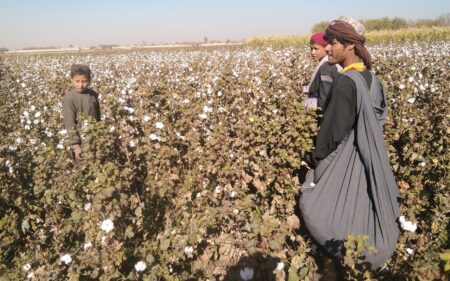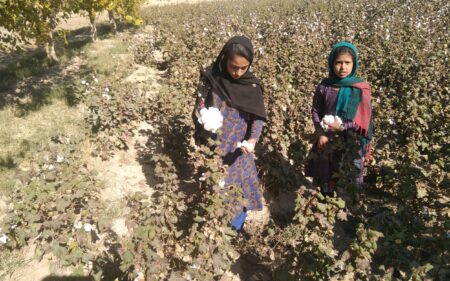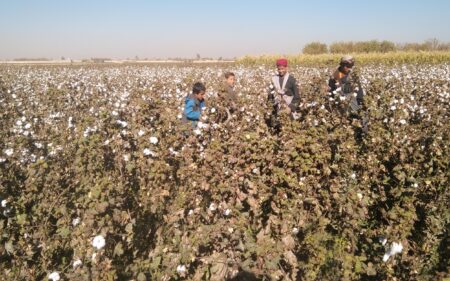According to the local officials of Helmand, efforts have been made to prevent people from doing heavy work on their children and to encourage them to study.
Helmand has a lot of agricultural lands, but cotton cultivation is widely seen in many districts and regions of this province. Now is the time to collect the cotton crop in this province, a large number of young children (girls and boys) are busy collecting cotton.

This is the Kariz area where young children are busy picking cotton during the cotton season.
Among these children, 12-year-old Ehsanullah, who has a sunburned face, told Radio Killid that before collecting cotton he was studying in school.
(I pick cotton to earn money, and the house needs oil and flour and other things, and I have dropped the lesson.)
This child says that he collects cotton for 20 Afghanis and sometimes earns 100 or 120 Afghanis a day.
Meanwhile, we are introduced to another 9-year-old boy named Ahmad Wali. Although he looks a little tired compared to other children, he is happy. He is happy. Ahmad Wali has studied up to the second grade.
(My name is Ahmad Wali, I am nine years old, and my father told me to work hard. I was in the second grade when the government changed.)
Ahmad Wali asked the government and aid institutions to help him in the process of returning to education.
We return to Nad Ali from Kariz. There, a 10-year-old girl works alongside boys in a cotton factory. She looks very tired. When I asked her why she works so hard, she said, she has no choice but to work.
She asked for help from the government and added that if she receives support, she will go to school.
((I work here with my father, I don’t have a brother, here I pick cotton with my father, and the government should help us))

The parents of these children say that they have to do this with their children because there are no other jobs now.
A 45-year-old man named Abdul Karim told Radio Killid that we have to work on children.
He added that if the government helps him and provides him with a job, he will never let his children to work and will send them to school.
((We have to take these children to work with us, this is a problem for us, if we don’t have to, we will send these children to school))
Mohammad Agha, another resident of Nad Ali, also says that people have to work hard on their children.
According to him, the drought of the last two years and the bad economic situation forced people to work in the fields with their children, both boys, and girls.
At the same time, legal experts say that people work hard on their children because of coercion, but government and child protection organizations are responsible for protecting children’s rights. They should help children to enjoy their rights.

Ahmadullah Wolesmal, a legal expert in Lashkargah, says that child protection organizations should help the farms where children do backbreaking work and provide them with educational facilities.
(UNICEF should pay attention to children in Afghanistan and they should pay attention to their rights and aspects of life.)
Local authorities in Helmand say that a series of programs have been started to educate people, so they do not burden their children with hard work and encourage them to study.
Mawlawi Rahimullah Mukhlis, head of Helmand’s work and social affairs, says that with the financial cooperation of UNICEF, locally friendly courses have been built in 8 districts of this province for the purpose of educating children, and family-related education is provided.
He adds that he organizes monthly meetings for heads of children’s families and provides public awareness about children’s rights.
((We hold monthly meetings related to children’s problems and, in addition, we bring the voices of children who are facing problems to the ears of government officials))
He adds: Charitable organizations have helped some orphaned children and have also activated orphanages for orphaned children.
Meanwhile, a large number of young children have started working in the agricultural fields of Helmand. During the previous government, many people worked in a series of jobs in this province, but now they are unemployed.
Translated by: Shir Ali Jafari
Follow TKG on Twitter & Facebook











